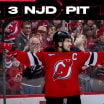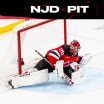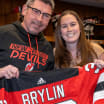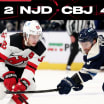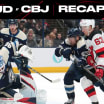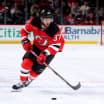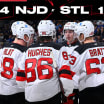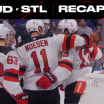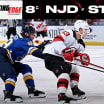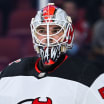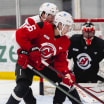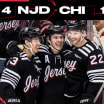Hockey is a war game on ice. That's the long and short of it.
And if you believe the maxim All's fair in love and war, you can understand why the Devils had a "Secret Weapon" ready to be employed prior to Game 1 of the Stanley Cup Final.
In the end, it would baffle the Detroit Red Wings general staff and lead to one of the most improbable upsets in modern hockey history.
The "Secret Weapon" had various labels, but the most frequently-used was named "The Neutral Zone Trap."
Hockey historian Andrew Podnieks observed, "Lemaire coached his team to play a defensive system of play that was the antithesis, ironically, of the firewagon hockey he had played with Montreal in the 1970s."
The Decisive Game 1 vs. Detroit | SUNDAYS WITH STAN
The Devils silenced a lot of critics with their Game 1 victory on the road against the Red Wings
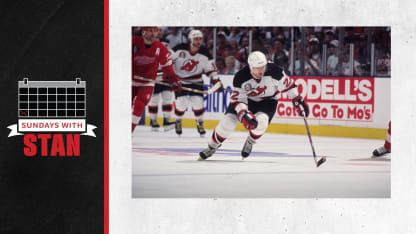
By
Stan Fischler
Special to NHL.com
SUNDAYS WITH STAN
1995 Stanley Cup Final: Devils vs. Red Wings
Previewing the 1995 Final
The Nervous Hours Leading to Game 1
No question; Lemaire was criticized by some for the trap but there was no law against it in the NHL rulebook nor anywhere else for that matter.
Jacques couldn't care less about his critics; plus, he had the best retort courteous. "No. 1," Lemaire shot back, "we score more than most teams and No. 2, it helps us win games."
Although the Devils and Red Wings had never faced each other in a regular-season game, during the aborted 1994-95 season, Detroit's sage coach Scotty Bowman had his aides scout the Garden Staters.
Bowman not only was clued into the nuances of Lemaire's system, he made it plain to his players what he thought about it.
"If we're trapped by the Trap," snapped hockey's winningest coach, "then you're trapped."
The Devils felt trapped as well while lining up for the National Anthem. Trapped by nasty crowd sounds. As a matter of fact, the sounds were downright insulting.
As the public address announcer began introducing each member of the Visiting team, the partisan audience followed each name with a raucous "WHO CARES?"
Meanwhile, Marty Brodeur had to decide what to do with the traditional octopi being tossed by fan on to the rink. "They don't smell good," the Devils goaltender later reported.
A few reporters in the New Jersey press corps were more concerned with the media notes being distributed by a Detroit PR person.
Among the scary stats was the fact that the Red Wings now boasted an 8-0 playoff record for home games and had outscored opponents by a top-heavy 30-11 count over the eight games.
"How many do ya think they'll put past Marty in the first period?" one pessimistic writer wondered out loud.
As it happened, there was no blowout.
In fact, the anticipated Devils implosion never happened.
Jacques Lemaire's skaters weathered Scotty Bowman's big push until the Red Wings were hit with a penalty. In no time at all the partisan crowd was numbed to silence as the Devils power play went in motion.
In no time at all, the puck wound up on Stephane Richer's stick. The slick French-Canadian was station about 25-feet from Mike Vernon poised, un-screened in the Detroit crease.
New Jersey's streamlined smoothie fired his patented slapshot which was typically speedy but eminently stoppable. Yet, somehow, the velocity carried it off Vernon's equipment and dribbled into the net at 9:41.
Of course, this was not supposed to happen. What was supposed to happen was a red light flashing behind Brodeur and, finally, it did. Dino Ciccarelli beat Marty less than four minutes after Richer's tally and order was - at least temporarily - restored to the Red Wings world.
But, what many expected to be the bursting of Brodeur's dam never happened again that night. Marty taught the disappointed crowd a lesson in Goaltending 101.
Marty was at his dazzling best - up, down, sideways and up again, doing a "Netminders Cha-Cha-Cha. Brodeur, in a word, was unbeatable.
Still, the score was tied and it was - as the up and down action demonstrated - still anybody's hockey game. Or, to put it another way, it was a matter of which club would have the clutch scorer to settle the match.
Early in the third period, John MacLean outhustled a Detroit defender deep left in the enemy zone and fired an angled shot at Vernon who made the save but failed to corral the rebound.
The biscuit skimmed tantalizingly out toward the blue line. Claude Lemieux saw it coming and unloaded a blazer that beat Vernon at 3:17 of the third.
"It was the result of pure hustle by MacLean that made this goal happened," explained a Hockey Night In Canada analyst. "Mac built the play and Lemieux finished it."
Now it was up to Brodeur to seal the win with more than 16 minutes remaining in the third frame. The Wings push was energetic, to be sure, but Marty's push-back saves became the difference.
Claude's slapper was all the Garden Staters needed as the final buzzer heralded a 2-1 Devils victory.
One wire service reporter typed out, "The Devils played a solid defensive game that frustrated Detroit's shooters."
Bowman's vaunted arsenal was able to generate 17 shots at Brodeur, providing the challengers with their ninth road win.
In the winner's dressing room, Lemaire singled out his game-winning shooter for special commendation.
"I've known Claude a long time," Jacques grinned, "a long, long time. And if there's one thing I learned about him, it's that when it's clutch time, he's the guy to deliver. He focuses better in the playoffs."
Hall of Fame announcer Mike (Doc) Emrick was as impressed as anyone with the final result.
"What I remember, for starters, was Richer's opening goal and then how Marty and his mates pretty well shut down the Wings," Doc asserted.
"For those Detroit fans who thought the series could be a sweep for the Motor City guys, well, that first game pretty much told them that it wasn't going to work out that way."
Emrick's colleague, Bill Clement - a member of the Flyers' two Stanley Cup-winning teams in 1974 and 1975 - was doing analysis for ESPN. After the first game, Clement chatted with Emrick.
Doc: "Bill related to me that for the Red Wings, it was a case of, 'Well now we've seen the Devils at last.'"
Not surprisingly, a few members of the home town reporting crew figured that New Jersey's victory was nothing more than one of those flukes; and the Red Wings were caught being overconfident.
"Scotty will straighten them out," snapped one in the Detroit journalistic pack.
On the New Jersey side, Associated Press hockey writer Tim Sullivan saw things differently.
"The Devils performance in Game 1 served notice to all the high flyers in the West that the Devils weren't fazed," noted Sullivan.
To some, the one-goal margin hardly suggested that the Red Wings were in trouble. Not with the likes of Yzerman, Fedorov, Ciccarelli and Coffey in the lineup. Game 2 figured to be a different story.
Or, would it?

